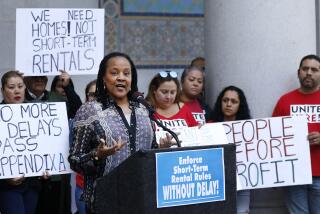Inconsistence Is Bad for Business
- Share via
The wee hours find most of us snug in bed, but they occasionally find insomniac Devar Pack filling up a Super Big Gulp and heading out for a relaxing drive on near-empty freeways. But Burbank city officials are mulling a plan that might disrupt Pack’s nocturnal habits by requiring new restrictions on all-night markets.
The plan would require public review of all markets near residential neighborhoods and would give city officials more control over such potentially contentious issues as parking, lighting and security. In some ways the proposal is similar to limits imposed on 24-hour restaurants last year. It seems, on the surface, like a good idea--a way to protect homes from intrusive businesses.
But Burbank’s proposal is the wrong approach. Why? Because it changes the rules on merchants who invested in their businesses with the expectation of a fair shake from the city.
Under the proposal, stores that are open between midnight and 6 a.m. and are near residential neighborhoods would be required to obtain a conditional-use permit. Such a permit would cost $500, require public hearings and ultimately give city officials more power over the operation of the market. That’s fine for new operations, but city officials also want to apply the restrictions retroactively to 11 of the 15 markets already open all night in Burbank. That’s burdensome and unfair.
Burbank already enjoys broad powers to crack down on businesses that bring trouble to surrounding neighborhoods. If a store makes too much noise or has a history of problems, the city can aggressively use nuisance laws to bring the owner in line. That’s appropriate use of city power. In addition, any store that sells alcohol already is subject to public review and conditions. Adding yet another fee and yet another hearing process hurts merchants whose business often comes from nearby residents and who are therefore keen to be good neighbors.
Residents have a right to expect quiet neighborhoods free from the noise and hassles that problem businesses attract. City officials have a duty to make sure that happens. But merchants also have a right to consistent and predictable rules. A preemptive strike against businesses playing by those rules sends a hostile message to merchants. As much as one-third of the business for some all-night markets occurs overnight as parents grab cough syrup for a sick child or late-night workers grab a cup of coffee for the drive home.
Since the building boom after World War II, cities across the country have used conditional-use permits as a convenient way of exerting additional control over perfectly legal--but often unpopular--land uses. In many ways, it’s an easy way out. But if business owners feel like they can’t count on the rules from one year to the next, they’ll go somewhere else. We all lose when they do.
More to Read
Sign up for Essential California
The most important California stories and recommendations in your inbox every morning.
You may occasionally receive promotional content from the Los Angeles Times.










